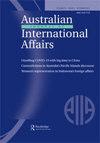机器人和自主系统在澳大利亚的发展:关键问题,演员和话语
IF 1.8
3区 社会学
Q2 INTERNATIONAL RELATIONS
引用次数: 1
摘要
机器人和自主系统(RAS)是众多新兴技术之一,各国正在寻求开发和使用,以在日益激烈的战略竞争环境中获得军事优势。在自主系统方面,澳大利亚是一个关键的参与者,可信自主系统(TAS)被指定为优先领域。RAS在澳大利亚的研究、论述、军事思想和国防工业中占有越来越普遍的地位。澳大利亚对这些技术的看法揭示了其更广泛的国防和战略前景的重要见解,包括他们对战争特征如何变化的理解,以及他们对联盟和伙伴关系的态度。在本文中,我将追踪TAS如何成为澳大利亚国防的优先领域,并提供自2016年以来RAS的关键发展的盘点。这将包括关键角色、资金、论述和技术。对澳大利亚RAS的评估揭示了几个突出的关键主题:控制、信任、道德、互操作性、领先于对手、减少对国防人员的危险,以及开发廉价、小型和一次性使用的系统。本文章由计算机程序翻译,如有差异,请以英文原文为准。
The development of robotics and autonomous systems in Australia: key issues, actors, and discourses
ABSTRACT Robotics and autonomous systems (RAS) are amongst a plethora of new and emerging technologies states are seeking to develop and use to gain military advantage in an environment of intensifying strategic competition. Australia is a key player when it comes to autonomous systems, with trusted autonomous systems (TAS) being earmarked as a priority area. RAS have taken an increasingly prevalent place in Australian research, discourse, military thinking, and defence industry. How Australia thinks about these technologies reveals important insights into their broader defence and strategic outlook, including their understanding of how the character of warfare is changing, and their approach to alliances and partnerships. In this article, I will trace how TAS became a priority area for defence in Australia, and provide a stocktake of the key developments in RAS which have taken place since 2016. This will include key actors, funding, discourses, and technologies. Taking stock of RAS in Australia reveals several key themes which stand out: the centrality of the concept of control, trust, ethics, interoperability, keeping ahead of adversaries, reducing danger to defence personnel, and developing systems which are cheap, small, and single-use.
求助全文
通过发布文献求助,成功后即可免费获取论文全文。
去求助
来源期刊

Australian Journal of International Affairs
INTERNATIONAL RELATIONS-
CiteScore
3.20
自引率
13.30%
发文量
44
期刊介绍:
AJIA is the journal of the Australian Institute of International Affairs. The Institute was established in 1933 as an independent and non-political body and its purpose is to stimulate interest in and understanding of international affairs among its members and the general public. The aim of the Australian Journal of International Affairs is to publish high quality scholarly research on international political, social, economic and legal issues, especially (but not exclusively) within the Asia-Pacific region. The journal publishes research articles, refereed review essays and commentary and provocation pieces. ''Articles'' are traditional scholarly articles. ‘Review essays’ use newly published books as the basis to thematically examine current events in International Relations. The journal also publishes commentaries and provocations which are high quality and engaging pieces of commentary, opinion and provocation in a variety of styles. The Australian Journal of International Affairs aims to analyse international issues for an Australian readership and to present Australian perspectives to readers in other countries. While seeking to stimulate interest in and understanding of international affairs, the journal does not seek to promote any particular policies or approaches. All suitable manuscripts submitted are sent to two referees in a full ''double blind'' refereeing process.
 求助内容:
求助内容: 应助结果提醒方式:
应助结果提醒方式:


